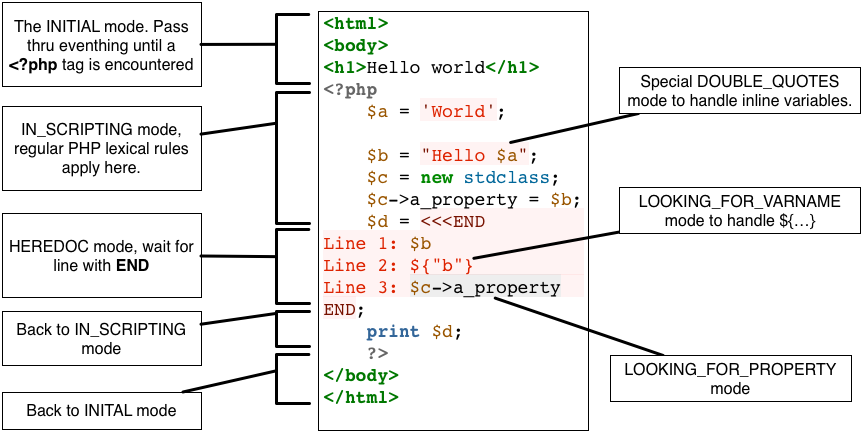Missing lexer modes
As discussed in the previous section the scala combinator framework is quite powerful and already offers a generic support for lexical anaylzers. Unluckily this does not suffice for PHP, since there is no support for lexer modes.
What’s a lexer mode
In classical lexer generators modes are a feature to tag rules, i.e. to turn on and off certain rules depending on the mode the lexer currently operates in. Usually lexer modes can be used in form of a stack, i.e. you might push a new mode to the stack and eventually pop back to the original mode.
An often used example of lexer modes are comments: If the lexer encounters a /* it switches to an “in comment” mode where everything is ignored and pop back to its previous mode once an */ is encountered.
The many lexer modes of PHP
Since lexer modes are basically just selectors for rules, it is always possible to rewrite any lexer to operate in a single mode. After all scala’s StdLexer is perfectly capable of handling /* ... */ style comments without relying on lexer modes. The drawback to this, that the removal the lexer modes may lead to a vast duplication of rules and a closer look at the original PHP lexer reveals that it has 10 modes in total:
- INITIAL
- IN_SCRIPTING
- DOUBLE_QUOTES
- BACKQUOTE
- HEREDOC
- END_HEREDOC
- NOWDOC
- VAR_OFFSET
- LOOKING_FOR_PROPERTY
- LOOKING_FOR_VARNAME
Most of these are demonstrated in this simple example:

Combining all there to a single rule set might be possible, but wont be pretty.
Lexer modes with scala combinators
The extension of the StdTokenParsers to a lexical analyzer with lexer mode support is pretty straight forward. First we define some very simple traits.
1 trait LexerMode {
2 def newLexer(): Lexer
3 }
4
5 trait Lexer extends Parsers {
6 type Elem = Char
7
8 def token: Parser[(Token, Option[LexerMode])]
9
10 val whitespace: Parser[Any] = success(Unit)
11 }
The idea is that a LexerMode serves as factory for a Lexer, whereas a Lexer defines a token parser and a whitespace parser. All input consumed by the whitespace parse is supposed to be ignored, by default the whitespace parser yields an immediate success without consuming anything. The token parser is the actual lexical analyzer the produces a Token and an optional LexerMode if a mode-switch is necessary.
The main magic happens in the implementation of the Reader[Token], that is used as input for the syntactical parser. At its core the implementation looks like this:
1 class TokenReader(in: Reader[Char], lexer: Lexer) extends Reader[Token] {
2
3 import lexer.{Success, NoSuccess, token, whitespace}
4
5 def this(in: String, lexer: Lexer) = this(new CharArrayReader(in.toCharArray), lexer)
6
7 private val (tok: Token, mode: Option[LexerMode], rest1: Reader[Char], rest2: Reader[Char]) = whitespace(in) match {
8 case Success(_, in1) =>
9 token(in1) match {
10 case Success((token, m), in2) => (token, m, in1, in2)
11 case ns: NoSuccess => (errorToken(ns.msg), None, ns.next, skip(ns.next))
12 }
13 case ns: NoSuccess => (errorToken(ns.msg), None, ns.next, skip(ns.next))
14 }
15
16 def first = tok
17
18 def rest = new TokenReader(rest2, mode.map(_.newLexer()).getOrElse(lexer))
19
20 ...
21 }


 Feed abonnieren
Feed abonnieren Newsletter abonnieren
Newsletter abonnieren